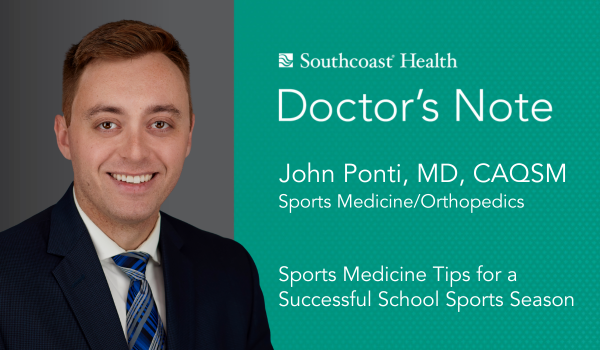Doctors' Notes
Doctor’s Note – August 2024

Sports Medicine Tips for a Successful School Sports Season
As students head back to school, many are also gearing up for a new season of sports. Whether they’re seasoned athletes or trying out for a team for the first time, it’s crucial to prioritize health and safety. This month, Dr. John Ponti from Southcoast Health Orthopedics & Orthopedic Surgery shares some essential tips to help keep your young athletes safe, healthy and injury-free.
First Things First
Even if their school doesn’t require a sports physical, it’s important to see your Primary Care Physician (PCP) for a physical exam before starting any sport. This ensures your child is healthy and fit for physical activity. It can also identify any underlying health issues that might need attention.
Equally important, always be sure your child uses proper equipment. That includes making sure shoes, pads, helmets and other protective gear fits properly and is in good condition. Ill-fitting or damaged equipment can increase the risk of injury.
Start Slow
Always start with a proper warm-up to get the muscles ready, and end with a cool-down to speed recovery. Dr. Ponti recommends light jogging and plenty of stretching.
“If your child has been less active over the summer, gradually increase their physical activity level to build up their endurance, strength and flexibility,” says Dr. Ponti. “Sudden, intense activity can easily sideline your child.”
Eat Well & Stay Hydrated
A balanced diet rich in lean proteins and plenty of fruit, vegetables and whole grains can provide the energy and nutrients needed for optimal performance. It’s also important to stay hydrated! Hydration is crucial, especially during physical activities. Encourage kids to drink water regularly before, during, and after practice and games to prevent dehydration – but be sure to avoid sugary drinks.
Listen to your Body
Encourage your kids to pay attention to their bodies. If they feel pain or discomfort, they should stop playing and let a coach or adult know. “Ignoring pain can lead to serious injuries,” Dr. Ponti says. “Be sure they’re getting adequate rest and taking the time to heal if they’re feeling any pain.”
If your child does suffer a sports-related injury, get treatment right away – don’t let them “play through the pain.”
Wishing you an active and healthy sports season.
John Ponti, MD, CAQSM | Sports Medicine/Orthopedics
